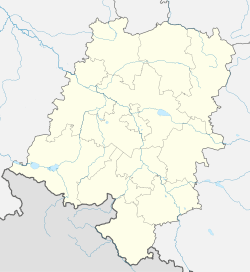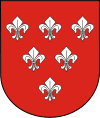Koperniki
Koperniki ([kɔpɛrˈniki]; formerly German Köppernig, Köppernick, Koppirnik (obsolete - used 1845), Latin Copirnik, Copernik is a village in the administrative district of Gmina Nysa, within Nysa County, Opole Voivodeship, in southwestern Poland.[1]
Koperniki | |
|---|---|
 General view | |
 Koperniki  Koperniki | |
| Coordinates: 50°24′N 17°17′E | |
| Country | |
| Voivodeship | Opole |
| County | Nysa County |
| Gmina | Gmina Nysa |
| Time zone | UTC+1 (CET) |
| • Summer (DST) | UTC+2 (CEST) |
| Area code(s) | +48 77 |
| Car plates | ONY |
It lies approximately 9 kilometres (6 mi) southwest of Nysa and 55 km (34 mi) southwest of the regional capital Opole. It was the ancestral village of Nicolaus Copernicus (born Niclas Koppernigk), whose great-grandfather had moved to then Polish capital Cracow (Polish Kraków, German Krakau) in c. 1380.[2] The etymology of the name has been debated especially in the context of the biography of Copernicus, since at least the 1870s, surrounding two competing proposals, one suggesting the name root origin from the German word for copper (Kupfer), the other from the Polish word for dill (koper).[3] The suffix -nik (or plural -niki) denotes a Slavic and Polish agent noun.
It is first mentioned in 1272, as Coprnih.[4] and in 1284 was listed as one of 65 major German settlements in the Duchy of Nysa. As part of the Duchy of Nysa, it passed from the rule of Silesian branch of the Polish Piast dynasty to the Crown of Bohemia in 1342, and with Bohemia to the House of Habsburg in 1542. In 1742, it fell to Prussia as part of the settlement following the First Silesian War. In 1945, it became part of Poland, as Koperniki. The German population was displaced, and the village was re-populated with Polish settlers from Wiktorówka (Tarnopol Voivodeship) and Jeleśnia.[5]
Notable residents
- Franz Josef Niedenzu (1857–1937), German botanist
References
- "Central Statistical Office (GUS) - TERYT (National Register of Territorial Land Apportionment Journal)" (in Polish). 2008-06-01.
- see e.g. Jan Adamczewski, The Towns of Copernicus (1972), p. 12. The question of the ancestral Silesian origin of Copernicus' family was established by Georg Bender ("Heimat und Volkstum der Familie Koppernigk (Coppernicus)", Darstellungen und Quellen zur schlesischen Geschichte 27 (1920). Bender established the family's origin from Köppernig near Nysa over the competing suggestion of their possible origin from Köpprich (sometimes [erroneously?] written Köppernick) near Neurode (modern Przygórze). The surname Kopernik is recorded in Krakau from as early as 1350; The earliest known ancestor of Nicolaus Copernicus is his great-grandfather, Johan Kopernik, who received Krakau citizenship in 1386. Jack Repcheck, Copernicus' Secret: How the Scientific Revolution Began (2007), p. 31.
- Magazin für die Literatur des Auslandes, 1875, 534f. The dispute became virulent in the 1960s, culminating in a controversy between E. Mosko ("copper") and S. Rospond ("dill") during 1963/4, summarized by Zygmunt Brocki, "Wsrôd publikacji o etymologii nazwiska Mikotaja Kopernika [Among the publications on the etymology of the name of Nicholas Copernicus]" Komunikaty mazur.-warm., 1970).
- diecezja.opole.pl
- Vgl. "Miejscowości osiedleń grupowych ludności wiejskiej pochodzącej z obszaru Polski w granicach do 1939;". Archived from the original on March 17, 2009. Retrieved April 25, 2017.
- Felix Triest, Topographisches Handbuch von Oberschlesien, Volume 1 (1865), p. 1014.
| Wikimedia Commons has media related to Koperniki. |
